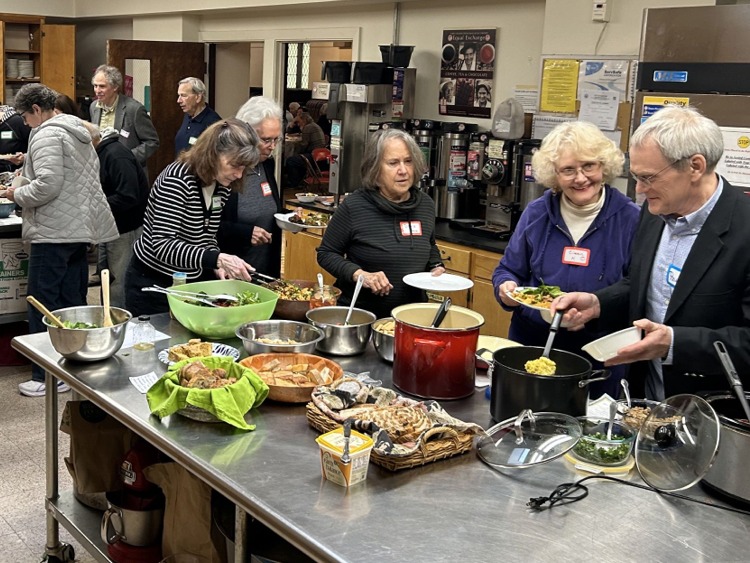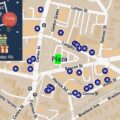The food we eat is an intensely personal choice (unless there are shortages or financial limitations). While some make decisions based on religious rules or life-threatening allergies, others are inspired to make changes due to concerns about overall health, the environment, and animal welfare.
Newton residents Diana Goldman, Mary Fitzgerald, John Dundon, and Jeffrey Baker became vegans or eat a plant-based diet for a variety of reasons and enjoy sharing their cuisine with others.
The terms “vegan” and “plant-based diet” are often used interchangeably, although there are some differences. According to the Mayo Clinic, “With a whole-food plant-based diet, [people] focus on eating foods that are primarily coming from plants and that occur in their natural state. Veganism also takes that into account but can incorporate other social and justice factors into that lifestyle.”
The decision to eschew all animal-based food products was not made lightly by Goldman, Fitzgerald, Dundon, Baker, and others.
For some, it can feel socially isolating, since only a relatively small number of Americans eat this way. According to a 2023, Gallup Consumption Habits poll, 4% of Americans identify as vegetarians while only 1% identify as vegans.
One way the Newton residents have addressed concerns about social isolation is by creating more opportunities to hold gatherings featuring plant-based meals and encouraging restaurants to offer more options.
For example, this is the final week of the Newton’s Vegan Chef Challenge. During the month of May, as reported in Fig City News, 18 Newton restaurants added plant-based options to their menus, allowing more customers to try out dishes they may never have experienced before.
Fitzgerald, who became a vegan about nine years ago, organized the challenge and said some of the participating restaurants will keep the new plant-based dishes on their menu beyond May.
“Our hope is that by creating new and tasty items where plants are the main attraction, people will start to look at these options as delicious, healthful and sustainable alternatives to what we’ve been traditionally offered,” she said. “Although we are thrilled to have new vegan options out there across town, what we’re really encouraged by is the awareness we’re building because that’s what will keep these businesses interested and committed to trying out and offering new plant-based fare beyond the challenge.”

Finding camaraderie
Looking to expand their culinary social circle, Baker and some others co-founded the UU Plant-Based Eating Club in 2019 at the First Unitarian Universalist Society in Newton.
“We try to be as inclusive as possible,” said Baker, who added that people do not have to be church members to join the club. “It’s for anyone interested in eating more plant-based.”
The group holds monthly potlucks at different homes, and in the past about 9-13 people have come each time. Once a quarter, they all meet at a larger venue where about 45 people have attended.
The club asks attendees to try preparing a plant-based recipe they feel comfortable making, even if it’s a familiar salad or beverage.
At the gatherings they might review books, movies, host discussions, hold a cooking workshop and more.

“We do a lot of education,” said Baker.
Most people in the group are not 100% vegan. “Some just want to know more about plant-based eating,” said Dundon.
“It’s just great when we’re all together and sharing really well-made food,” he said, noting it’s nice to not worry about what’s on the buffet.
Dundon became a vegan in 2016 after his then-17-year-old daughter asked him to try it for 30 days. Baker made the overnight decision 11 years ago.
“I decided it was the best diet for health,” said Baker.
He said navigating the food landscape outside of his own kitchen was more challenging a decade ago. In fact, the week Baker began eating only plants, he also started a new role at work and had to travel to Houston, Texas. His co-workers had arranged for dinner at a steakhouse. Left with few options, Baker ordered a baked potato and some vegetables.
“I was super self-conscious,” he recalled. However, his co-workers asked him about his decision in a respectful way, and they ended up having a good conversation. “It was such a sigh of relief.”
Nowadays, even sports bars usually offer veggie burgers. Baker recommends when going out to eat, it’s always good to call ahead, especially if it’s a new place, to be sure there is something plant-based on the menu.
Newcomers to the potlucks have discussed the social challenges they have faced. For example, figuring out what to do when invited to someone’s house for dinner and wondering if they’ll be “judged” for their choice.
Dundon said some people call themselves “cheat-ans” because they may eat animal products outside of the home at events or in situations where they have less control.
Baker said he discovered “a lot of people are really curious” about plant-based eating and interested to learn how he made the decision. He said he lets people ask him first, so he does not appear to be “proselytizing” about veganism.
New cooking horizons
When Dundon first made the change, he called himself “a junk-food vegan,” since he bought prepared plant-based meals, but he now eats less of that. “It’s an adjustment” to try new methods of food preparation, he said.
Baker also had to expand his culinary repertoire, and he decided to learn more about rice alternatives. Since his go-to meal is a grain bowl, during a club workshop, he introduced participants to seven less-common grains: buckwheat groats, sorghum, hulled barley, spelt, oat groats (whole grain kernel that has not been refined), millet, and einkorn wheat. Preparing them in advance — since they can take a while to make — Baker said people enjoyed trying the samples.
“It was like a wine tasting,” he said. You can make a large amount and refrigerate it for the week to save time.

Diana Goldman was already a chef when she became a vegan in 2013, after watching the documentary “Earthlings.” The movie focused on how people use animals for food, clothing, scientific research, entertainment, etc. Troubled by what she saw, she asked herself, “Is it necessary to consume animal products to be healthy?” By the end of the day, she went from being an omnivore to eating a plant-based diet.
Goldman is a Sierra Club cooking show host and a plant-based nutrition educator. She recently self-published a vegan cookbook called Plants for You, after receiving enthusiastic responses to her dishes.
Like the other Newton residents, Goldman recognized that social pressures around eating can be daunting.
“Humans want to fit in … and we don’t want to be perceived as being difficult,” she said. “It takes effort … and that’s not necessarily celebrated in the food world.”
To help people navigate those challenges, she has tried to simplify the plant-based preparation process in her book.
“It’s an investment in the planet … and in your health,” said Goldman.
She also looks forward to attending a UU club gathering with other plant-based food enthusiasts.
“I so admire what they’re doing to build community,” she said.







